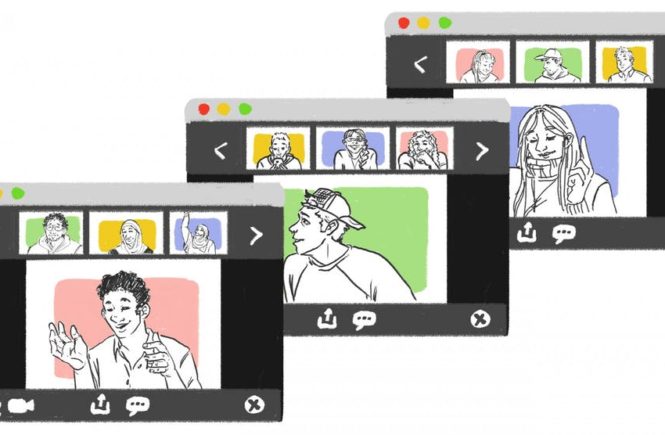Religious communities on campus are using alternative methods to continue worship during the COVID-19 pandemic
Just as buildings across campus are desolate and all but abandoned, so too are the churches, synagogues and temples that surround the University of Minnesota community. Dozens have canceled sermons or moved to online services in response to the coronavirus outbreak, which, in the past several weeks alone, has resulted in the shuttering of area restaurants and prompted the cancellation of in-person classes through the end of the spring semester.
Though pews may stay empty for the foreseeable future, students and worship leaders are finding new, alternative ways to continue to maintain a sense of normalcy in their communities – even when in-person contact is all but impossible. The Minnesota Daily followed several religious student groups and chronicled the changes.
Chabad U of M
One of the hallmarks of Chabad is Friday night Shabbat dinners, said Rabbi Yitzi Steiner, co-director of the University’s branch of Chabad. Part of an international Jewish organization, Chabad is a Jewish student center on campus that aims to provide students a place to explore their heritage and faith.
On any given Friday at Chabad, candles are lit, challah bread is broken, songs are sung and anywhere from 50 to 150 students gather to share a family-style dinner.
Now, with Governor Tim Walz’s ‘stay-at-home’ order, the voices and presence of dozens of Jewish students will not fill Chabad until at least the end of the semester.
Steiner said Shabbat dinners are some of the most fundamental Chabad activities and provide a sense of community for Jewish students on campus. In order to keep that sense of community alive, Shabbat dinners are being offered with a twist: now, they’re take-out.
Last Friday, Chabad provided around 50 premade take-out Shabbat dinners, complete with candles, challah bread and grape juice. The meals were able to feed up to five individuals, so students could share a meal with their family or a small group of roommates.
“It’s really nice to know that there are 50 groups of people who have families of friends all getting together and are still keeping Shabbat alive, even if we’re off campus,” said Chabad Board Vice President Shaina Kravetz.
Shabbat dinners are not the only thing to shift since the outbreak of COVID-19. Chabad hosts Jewish education classes that have now moved to Zoom. Shabbat 300, a dinner set to host more than 300 community members, has been canceled.
Chava Bouchard, a University senior and Chabad board president, said that though the digital transition has gone well, she was saddened by the “lasts,” such as the last in-person Shabbat dinner or Chabad outing, that seniors experienced without even knowing it.
“For seniors, it feels like a lot of our ‘lasts’ have been stolen from us. It’s just really disappointing for people to lose out,” Bouchard said. “But we don’t lose the connections just because we’re not there.”
According to Steiner, those connections and personal relationships, even if virtual, are key to continuing the presence Chabad has had on campus for Jewish students.
“Chabad is still doing what it’s been doing. Its doors are still always open – just metaphorically now,” Kravetz said.
Muslim Student Association
Mohamud Awil Mohamed became the chaplain of the Muslim Student Association at the beginning of fall semester 2019. Though he has been involved in faith work and community building for the past 10 years, he has never had to confront the issues now facing him as a religious leader.
“We are charting new territory. We are treading the waters, and we don’t know how deep the waters are,” Mohamed said.
For Mohamed, a typical pre-pandemic day consisted of faith-based teaching or meeting with students about the everyday anxieties of college, like internships or postgraduate career plans.
Now, students call or video chat with him, asking for advice on how to support themselves or their families when jobs they had have been suspended or eliminated completely.
Following recommendations from the University and Centers for Disease Control, Mohamed suspended Jummah prayers — Friday group prayers for Muslims — in an effort to prevent the spread of COVID-19, according to a statement posted to the MSA Facebook page.
Other events and speaking engagements have been canceled or postponed indefinitely.
Mohamed said he knows the transition may be difficult for some students. The Al-Madinah Cultural Center, where MSA is housed, is often a place of refuge, he said.
“MSA is a beacon on campus for the Muslim student community,” Mohamed said. “It is a home away from home, a place where students can recharge, where people look like them, eat what they eat and have the same cultural connections they have.”
Like many other student groups, Mohamed said MSA will make an online transition for events and activities, though the specific platform and format is still up in the air.
He sees this as a time of growth and reinvention for many. For example, during Ramadan, Muslims traditionally break daily fasts by sharing a meal with a group of people. Though the fasting will likely remain, the group dynamics may change during the pandemic.
For Muslims who place emphasis on prayer in public spaces, Mohamed said prayer in isolation can be more rewarding if it means protecting the health of the community at large.
Mohamed said he hopes this time can be a learning opportunity. For a student group and community driven by personal interactions, maintaining a sense of community means redefining it.
“Perhaps this is a time to reassess what it means to find a place and call it home. Home can be transient,” Mohamed said. “You’re only on campus for a limited time, and we have a chance to learn to carry community in ourselves as individuals and maintain those connections.”
Catholic Students United
On Monday afternoon, Carly Daugherty did something she hadn’t done before to host a small group prayer session for Catholic Students United: grabbed her phone, went to the CSU Instagram account and started a live story.
“I guess our jobs have been replaced by technology a little bit right now,” she said with a chuckle. “But we’re still trying to find ways to kind of make up for that and keep people connected to each other.”
Typically, CSU hosts both small and large group events. There are game nights, dinners and Gopher Catholic Nights, which were hosted every Tuesday evening and drew about 100 Catholic students.
As the University began taking measures to prevent an outbreak of the coronavirus on campus, all of that had to change.
Masses at St. Lawrence Catholic Church, home of CSU, are now being posted online. Catholic Gopher Nights are no more; they’ve been replaced by small group meetings over Zoom, Skype or FaceTime. Additionally, student leaders, like Daugherty, are beginning to broadcast prayer sessions on Instagram Live every day at 3 p.m.
For Austin Redington, secretary of CSU, living through a pandemic is a whole new experience, but online meetings with the group are not.
During his freshman year, Redington was involved in a small group that continued to meet via FaceTime and Skype on into the summer – even when most members of the group had out-of-state internships.
“That was one of the best experiences for me was having a place every week, every Monday night … we blocked off like an hour and a half, and we just caught up about life,” he said.
Father Jake Anderson, parochial administrator at St. Lawrence Catholic Church, said that he has seen fear at the uncertainty of it all reflected in the faces and comments of his parishioners, particularly the older ones.
The transition to online services is taking some adjustment, he said. The move was made after the Archdiocese of Saint Paul and Minneapolis released local Catholics from having to attend mass in attempts to curb the pandemic.
However, moments of transition like these can be used as opportunities to do good, Anderson said.
“We have a thriving young adult community, and there’s an example of people who’ve really stepped up to the plate,” he said. “They’ve basically offered to get things from pharmacies or grocery stores for older parishioners and bring it to their home personally.”
Anderson added that while this may be a time when some turn away from their faith, others may look to it for reassurance.
Daugherty, who is in charge of promotions for CSU, has seen this reflected in her work. She has seen an uptick in people engaging with their social media content or subscribing to the group’s newsletter.
Despite the upheaval the group has experienced in the past two weeks, Redington is still optimistic.
“Though it’s kind of hard to imagine, miraculous things can happen, even in times like these,” he said. “We just have to look for them.”


